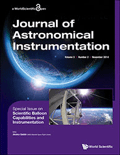
Journal of Astronomical Instrumentation
metrics 2024
Unveiling the Universe with Precision Instruments
Introduction
The Journal of Astronomical Instrumentation, published by WORLD SCIENTIFIC PUBL CO PTE LTD, is a pioneering peer-reviewed journal that has established itself as a vital outlet for the dissemination of research in the fields of astronomy and astrophysics, as well as in instrumentation technologies. Since its inception in 2012, this international journal has provided a platform for researchers and practitioners to share their findings, innovations, and insights pertaining to astronomical tools and techniques. With an esteemed Q3 categorization in both Astronomy and Astrophysics and Instrumentation for 2023, it ranks within the top tier of journals in these disciplines, demonstrating its impact and relevance in the scholarly community. Covering a broad range of topics that encompass the design, development, and application of astronomical instruments, the journal also emphasizes technological advancements that enhance observational capabilities. Researchers, professionals, and students alike will find this journal an invaluable resource for staying abreast of current trends and breakthroughs in the field of astronomical instrumentation.
Metrics 2024
 0.45
0.45 1.50
1.50 1.90
1.90 28
28Metrics History
Rank 2024
Scopus
IF (Web Of Science)
JCI (Web Of Science)
Quartile History
Similar Journals

Journal of the Korean Astronomical Society
Charting New Frontiers: The Pulse of Astronomical ResearchWelcome to the Journal of the Korean Astronomical Society, an esteemed publication dedicated to advancing the fields of Astronomy and Astrophysics as well as Space and Planetary Science. Established in 1993 and under the reputable auspices of the Korean Astronomical Society, this journal serves as a vital platform for researchers and scholars from South Korea and around the globe to disseminate innovative findings and critical insights. With a commendable Q2 ranking in Astronomy and Astrophysics and a Q3 ranking in Space and Planetary Science, this journal is positioned among the influential voices in its fields, fostering collaboration and knowledge exchange. The journal's rigorous peer-review process ensures that published works contribute significantly to ongoing discussions and developments in astronomical research. While currently not an open-access journal, it remains accessible to the academic community, encouraging readers to stay abreast of the latest advancements in the sciences that elucidate the universe's complexities. Join us in exploring the cosmos through cutting-edge research and scholarly discussion that propels the field forward.
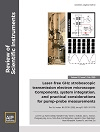
REVIEW OF SCIENTIFIC INSTRUMENTS
Fostering Excellence in Scientific Research and DevelopmentWelcome to the Review of Scientific Instruments, an esteemed journal published by AIP Publishing that has been a cornerstone in the field of scientific instrumentation since its inception in 1930. With an ISSN of 0034-6748 and E-ISSN of 1089-7623, this journal serves as a vital platform for the dissemination of innovative research and advancements in both Instrumentation and Medicine, categorized in Q3 quartiles in 2023. The journal has proudly maintained its relevance, forecasting continued publication through 2024, while providing critical insights that influence contemporary practices in various scientific domains. The impact factor reflects its contribution to the academic community, making it an invaluable resource for researchers and professionals seeking to stay at the forefront of scientific progress. Although Access is not open, the rigorous peer-review process ensures that published works are of the highest quality, making the Review of Scientific Instruments a must-read for anyone involved in the intricate world of experimental science and technological innovations.
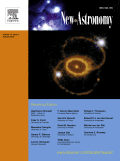
NEW ASTRONOMY
Advancing Understanding in Astronomy and AstrophysicsNEW ASTRONOMY, published by Elsevier, stands as a pivotal platform in the field of Astronomy and Astrophysics. With an ISSN of 1384-1076 and an E-ISSN of 1384-1092, this journal has solidified its reputation over its operational years, from 1996 to 2025. Located in the Netherlands, it ranks in the Q2 category for Astronomy and Astrophysics and Instrumentation, and Q3 for Space and Planetary Science, affirming its significant contribution to these disciplines. With a Scopus rank of #37/90 in Astronomy and Astrophysics and a respectable 59th percentile, this journal is essential for researchers and professionals seeking cutting-edge findings and methodologies. Although not open access, NEW ASTRONOMY remains dedicated to providing a rich repository of knowledge, featuring exceptional peer-reviewed articles that explore novel astronomical phenomena and advancements in instrumentation. Engaging with this journal will not only enhance your understanding of current trends in the cosmos but also contribute to the ongoing dialogue within these dynamic fields.

SOLAR SYSTEM RESEARCH
Illuminating the Mysteries of the Solar SystemSOLAR SYSTEM RESEARCH, published by Pleides Publishing Inc, offers a comprehensive platform for the exploration and dissemination of scientific knowledge in the fields of Astronomy, Astrophysics, and Space and Planetary Science. With its origins tracing back to 1969, this journal provides a vital resource for researchers and professionals seeking to deepen their understanding of the solar system's complexities, including planetary formation, extraterrestrial geology, and the dynamics of celestial bodies. Although categorized in the Q4 quartile for both relevant disciplines, SOLAR SYSTEM RESEARCH remains committed to publishing high-quality research that contributes to advancing contemporary scientific discourse. Dedicated to fostering collaboration and innovation, the journal is indexed in Scopus and adheres to rigorous academic standards, making it an essential resource for students and professionals alike pursuing the latest developments in solar system studies.
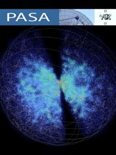
PUBLICATIONS OF THE ASTRONOMICAL SOCIETY OF AUSTRALIA
Driving Innovation in Astronomy and Astrophysics.Publications of the Astronomical Society of Australia, published by Cambridge University Press, stands as a distinguished platform for advancing knowledge in the realms of Astronomy, Astrophysics, Space, and Planetary Science. Hemmed in the United Kingdom, this journal is recognized for its outstanding contributions, reflected in its status as a Q1 journal in both Astronomy and Astrophysics, along with Space and Planetary Science categories as of 2023. With a solid impact factor, it ranks impressively at #23 within its Scopus category, firmly placing it in the competitive 75th percentile. This publication facilitates open discourse and innovative research from its inception in 1996 to the present year of 2024, providing an essential resource for researchers, professionals, and students eager to deepen their understanding of cosmic phenomena. By embracing rigorous peer-review standards and a commitment to scholarly excellence, the journal not only contributes to the scientific community but also fosters the next generation of astronomical research.
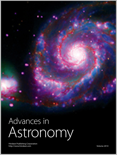
Advances in Astronomy
Illuminating the Universe Through Open Access Research.Advances in Astronomy is a prestigious open-access journal published by HINDAWI LTD, dedicated to the field of astronomy and astrophysics. Established in 2008, the journal aims to disseminate significant research findings and advancements in the understanding of celestial phenomena, planetary sciences, and the intricate workings of the universe. With an impact factor that reflects its relevance in the scholarly community, Advances in Astronomy holds a commendable rank of Q3 in both Astronomy and Astrophysics as well as Space and Planetary Science categories, indicating its importance within these fields. The journal also showcases a commitment to open-access publishing, ensuring that research is readily available to both the scientific community and the public. Researchers, professionals, and students alike are encouraged to contribute to this dynamic forum to share knowledge and foster collaboration in exploring the wonders of the cosmos.

Bulgarian Astronomical Journal
Illuminating the Universe Through ResearchThe Bulgarian Astronomical Journal, published by the BULGARIAN ACADEMY OF SCIENCES, INSTITUTE OF ASTRONOMY, serves as a vital platform for the dissemination of research in the field of Astronomy and Astrophysics. With the ISSN 1313-2709 and E-ISSN 1314-5592, this journal has been pivotal in showcasing original studies and advancements in astronomical sciences from 2014 and will continue to do so through 2025. Although categorized in Q4 within the ambit of Astronomy and Astrophysics, it provides essential insights and innovative findings, making significant contributions to the global academic community. Positioned in the lower quartile of Scopus rankings, recognized as #87 out of 90, it offers an opportunity for burgeoning researchers and seasoned professionals alike to engage with emerging ideas and trends in the discipline. While it currently does not feature an open access model, readers and contributors can anticipate a rich exchange of scientific knowledge that fosters collaboration within the astronomy community.
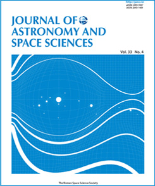
Journal of Astronomy and Space Sciences
Fostering Collaboration for a Deeper Cosmic Insight.The Journal of Astronomy and Space Sciences, published by the Korean Space Science Society, is a premier open-access platform dedicated to advancing the fields of astronomy, astrophysics, and space sciences. Established in 1984, the journal has been instrumental in disseminating high-quality research findings, fostering collaboration among scientists globally, and providing insights into the dynamics of our universe. With an ISSN of 2093-5587 and an E-ISSN of 2093-1409, the journal has gained notable recognition, currently ranking in the Q3 quartile in Earth and Planetary Sciences and Physics and Astronomy as of 2023. Although the journal's H-Index is currently unspecified, its commitment to rigorous peer-review processes and open-access availability ensures that groundbreaking research is accessible to a wide audience. Based in Seoul, South Korea, the journal is poised to continue supporting innovative research through 2024 and beyond. Researchers, professionals, and students alike will find valuable resources and opportunities within its pages, further establishing this journal as a crucial resource in the exploration of the cosmos.
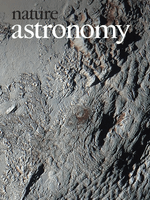
Nature Astronomy
Unlocking the Secrets of the Universe: A Platform for Innovative Astronomical Science.Nature Astronomy, published by NATURE PORTFOLIO, stands at the forefront of the field of Astronomy and Astrophysics. Since its inception in 2016, this esteemed journal has rapidly ascended to a prestigious position, achieving a Q1 ranking in the Astronomy and Astrophysics category and securing an impressive 6th place out of 90 journals in the Scopus rankings, placing it in the 93rd percentile. With a focus on disseminating pioneering research, Nature Astronomy provides a vital platform for the dissemination of high-quality, impactful findings across various aspects of astronomical science. Researchers, professionals, and students alike will find a wealth of knowledge and innovative perspectives within its pages, enabling them to stay ahead in a rapidly evolving field. Although it does not offer open access, the journal's commitment to excellence and its influence in shaping the future of astronomical research make it an indispensable resource for anyone serious about advancing their understanding of the cosmos.

ACTA ASTRONOMICA
Unveiling the Secrets of Space: A Hub for Innovative ResearchACTA ASTRONOMICA, the esteemed journal published by the COPERNICUS FOUNDATION POLISH ASTRONOMY, is a pivotal platform for disseminating significant advancements in the fields of Astronomy, Astrophysics, and Space Science. With an established history spanning from 1996 to 2023, this journal maintains a strong position in academia, evidenced by its Q2 ranking in both Astronomy and Astrophysics as well as Space and Planetary Science categories. Targeted at researchers, professionals, and students, ACTA ASTRONOMICA offers a comprehensive collection of articles that foster a deeper understanding of celestial phenomena, planetary exploration, and theoretical advancements in the universe. While it is not an open-access journal, its structured format caters to a global audience eager to engage with cutting-edge research. Notably, its Scopus rankings highlight its relevance, placing it in the 56th percentile for Astronomy and Astrophysics and the 44th percentile for Space and Planetary Science, ensuring that contributors are part of an influential community that is shaping the future of astronomical study.